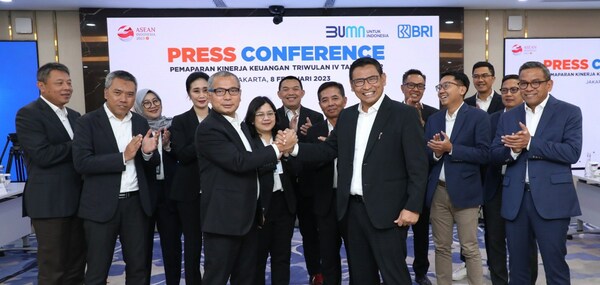The structure improvement of the Low-Cost Funds (CASA) was a key factor in BRI’s success. “The Ratio of Operating Expenses to Operating Income (BOPO) decreased to 69.10% from 78.54% in 2021. The Cost Efficiency Ratio (CER) and the Cost to Income Ratio (CIR) also improved from 2021 to 2022. In addition, the cost of credit was reduced from 3.78% in 2021 to 2.55% in 2022,” explained BRI President Director Sunarso.
BRI’s fee-based income reached IDR 18.80 trillion in Q4 2022, a 10.16% YoY growth, with an income ratio of 11.37%.
Furthermore, the bank recorded growth in Third Party Funds (DPK) with CASA as the main driver, and BRI’s deposits grew 14.85% YoY to IDR 1,307.88 trillion in Q4 2022. Currently, the proportion of BRI’s CASA is 66.70%. “This had a positive impact as reflected in BRI’s cost of funds decrease from 2.05% in 2021 to 1.87% in 2022,” added Sunarso.
BRI’s total loans and financing were recorded at IDR 1,139.08 trillion in Q4 2022 with a 13.9% YoY growth in micro loans, making MSME loans 84.74% of total loans.
BRI disbursed IDR 252.38 trillion of People’s Business Credit (KUR) to 6.5 million people in 2022, in accordance with the allocation set by the Government. For 2023, BRI has received IDR 270 trillion from the Government for KUR allocation. “BRI is optimistic to achieve its target with its ability to disburse an average of IDR 1 trillion KUR per-day,” said BRI Micro-Business Director Supari.
The success in carrying intermediary functions was balanced with prudent risk management that includes 305.73% NPL coverage reserves and a consolidated Loan to Deposit Ratio (LDR) of 87.09%. BRI’s ability to extend credit and financing is supported by adequate liquidity and strong capital, with a Capital Adequacy Ratio (CAR) of 25.54%.
“I believe that BRI will continue to grow with its sources of growth, sufficient capital and liquidity, and good risk management,” concluded Sunarso.
















